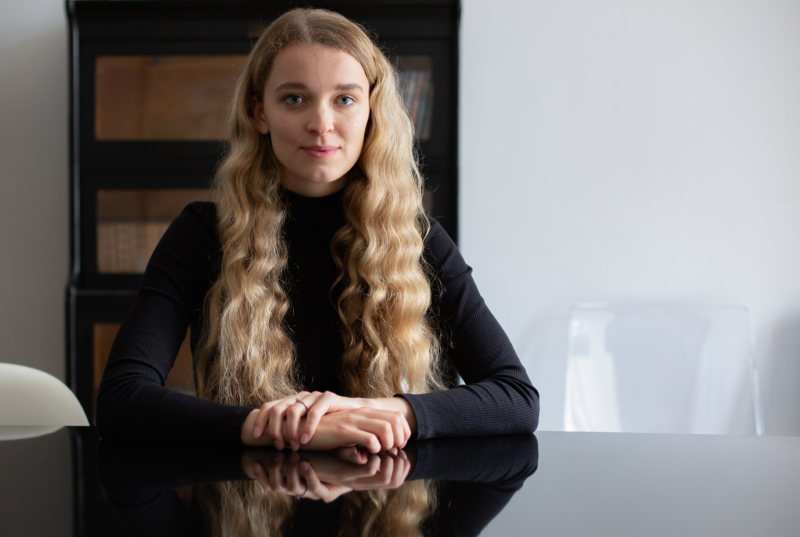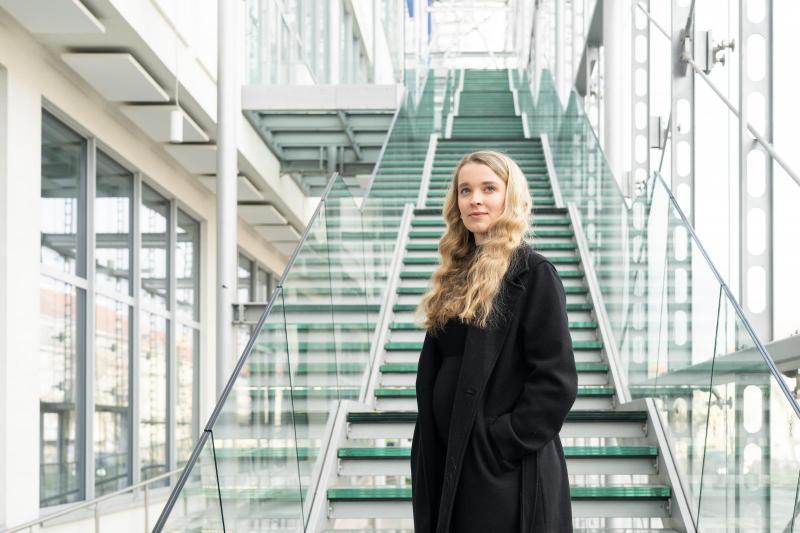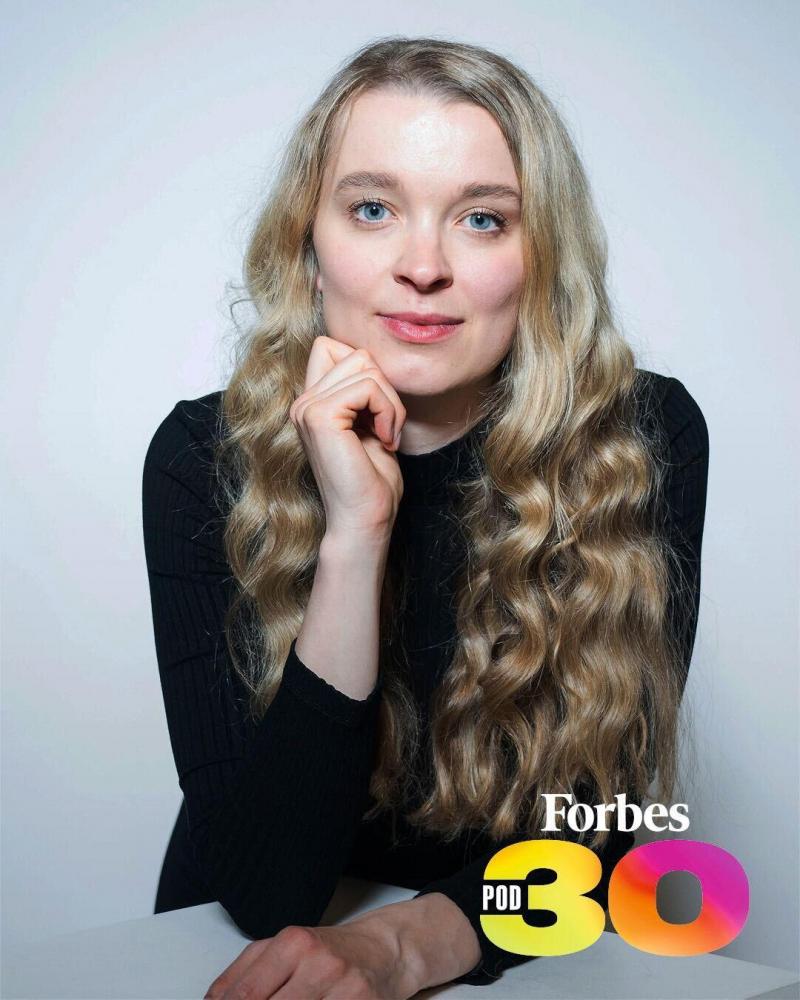It gave me motivation and confirmed to me that what I do has enormous potential, says the Forbes 30 Under 30 honoree

Kamila Dvořák balances science and business in her life. A graduate of the Faculty of Electrical Engineering and Communication at Brno University of Technology (BUT), she went on a study exchange to Finland after completing her bachelor's degree, which eventually led her to the prestigious Mayo Clinic in the United States. However, she didn’t want to only research biomedicine — her goal was to translate scientific knowledge into practice and truly impact lives. Today, she leads research and development at Neurona Lab, where they improve methods for detecting Alzheimer’s disease and elevate disease diagnostics to a whole new level.
The path of this successful bioengineer, who contributes to revolutionary diagnostic methods for neurological brain diseases, was anything but straightforward and full of coincidences. After high school, she had a wide range of interests and could have studied almost anything. She considered architecture, medicine, nuclear physics, or even air traffic control. “When I was deciding what to study, I looked up all the study programs available at various universities and literally went through them line by line to see what my options were,” Kamila says.
Since she enjoyed math, physics, and human biology the most in school, she was drawn to biomedical engineering at Brno University of Technology. Specifically, the Biomedical Technology and Bioinformatics program, which combines technology with medicine and is taught jointly at the Faculty of Electrical Engineering and Communication at BUT and the Faculty of Medicine at Masaryk University.
What captivated her most about studying at BUT was its diversity. “I loved that one day we had human physiology in the morning and programming in the afternoon,” recalls the FEEC alumna with a smile. But combining with medicine also had its challenges. Sometimes, the professors treated students more like medics than engineers and expected deeper medical knowledge than necessary. According to Kamila Dvořák, based on her vast experience, a solid technical foundation is far more important.
A Different World
Although Kamila once saw studying abroad as something unattainable, she applied for an Erasmus exchange and, after finishing her bachelor's degree in Brno, moved to Finland for a study stay. What was supposed to be six months turned into two years, during which she successfully completed her master’s degree. “I was fascinated by the block teaching system in Finland, which goes deeper and links theoretical knowledge with practical exercises,” explains the bioengineer, adding with a laugh that another motivation for staying was the fact that Finland doesn't require traditional oral state exams — only a thesis defense, which was much less stressful for her.
Thanks to the hands-on exercises, she began to realize all the possible career paths in front of her. However, the specialization that truly captivated her emerged only during her internship at the Mayo Clinic, one of the most prestigious hospitals in the United States. “I got there rather by chance, through a former classmate from Brno, and I felt like Alice in Wonderland as I learned how everything worked there,” Kamila laughs.

From Introvert to CTO
After a year-long internship in the United States, Kamila returned to the Czech Republic, still determined not to just study biomedicine, but to bring science closer to people and make a real difference. She started looking for Czech companies that offered the opportunity to translate biomedical engineering research into practice. Thanks to her experience and determination, she eventually began her professional career at the emerging medical start-up Neurona Lab, part of the parent company Channel Lab.
Since it was a brand-new project, Kamila became the first and initially the only employee. “It was a huge challenge for me. I had to learn a lot on my own and didn’t have anyone to guide me. Luckily, things turned out well, and now we have a full team dedicated to the project,” she says, now from her position as CTO. According to Kamila, her leadership role came naturally — it made sense that someone who had been there from the beginning would lead the growing team. Still, she admits that being a development director didn’t come naturally to her. “I'm more of an introvert, so I had to find my own ways of communicating with different people. It was exhausting at first, but eventually, it clicked. I learned a lot from my husband, who has been a big support,” she adds.
Today, Kamila Dvořák is involved in managing and overseeing development, clinical aspects, and communication with doctors, as well as strategic company planning. This means she needs insight into both technical and medical domains, although she doesn’t consider herself a scientist. She says she doesn’t do science as such, but only draws from it and tries to apply the knowledge gained to practice.
Launching a Diagnostic Revolution
Neurona Lab is an innovative health-tech company focused on more effective diagnosis of cognitive disorders, especially Alzheimer’s disease. Using algorithms, they analyze brain imaging and quantify the protein responsible for Alzheimer’s, contributing to early detection of neurodegenerative diseases. These methods mark a significant shift in healthcare and bring essential improvements in neurological disease diagnostics.
The Neurona Lab team works on several targeted projects related to Alzheimer’s disease. One of them is Neurona PET, which aims for more precise diagnosis. According to Kamila Dvořák, current diagnostics rely heavily on the doctor’s experience and are quite subjective. “We’re trying to improve that. We’re developing an algorithm that detects and quantifies the disease-causing protein and also localizes it in brain regions,” she explains confidently, adding that the amount of protein build-up can indicate how advanced the disease is—or if it’s present at all.
They aim to turn the software, which uses PET and MRI imaging to confirm the presence of Alzheimer’s-related proteins, into a certified medical device. But it’s not an easy task. Kamila says the entire development process needs to be carefully documented, each step reviewed by experts, and a clinical trial must be conducted—a lengthy and time-consuming process that can take years.
Other projects at Neurona Lab also focus on Alzheimer’s, aiming to identify the disease earlier or detect adverse effects of biological treatment. “We’re working on systems for hospitals and clinics, as well as a mobile app we hope to offer to the general public,” Kamila adds about the startup’s direction.
Women in Tech?
Despite working in a male-dominated technical field, Kamila feels comfortable. “I’ve never felt like I was given less space just because I’m a woman. But I do think women in these fields need to be a bit more assertive and able to stand their ground,” says the engineer with a slight smile, firmly believing that women belong in technical disciplines.
Kamila insists that girls shouldn’t be afraid of tech. All it takes is the mindset that they can do it. When choosing what to study, she believes support from parents and teachers is important — but students shouldn’t base their decision solely on what their families want. Their own motivation matters most.
The fact that women have a place in tech is confirmed by Kamila Dvořák’s inclusion in this year’s Forbes 30 Under 30 list, which recognizes young people who excel in their fields. “It’s an incredible honor. It gave me motivation and confirmed that I’m doing something with great potential,” concludes the bioengineer, encouraging young people not to be afraid to explore emerging fields and follow their passions.

Source: zvut.cz/en
| Responsible person | Ing. et Ing. arch. Jana Němcová |
|---|---|
| Date of publication |


